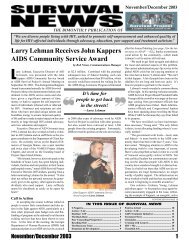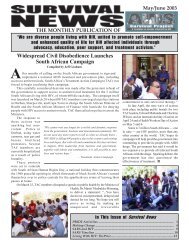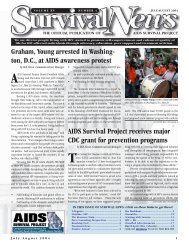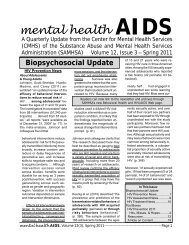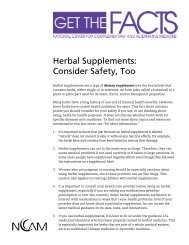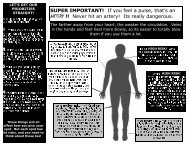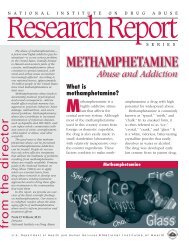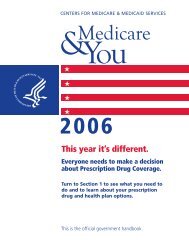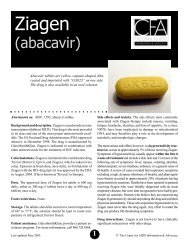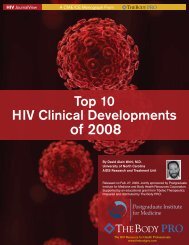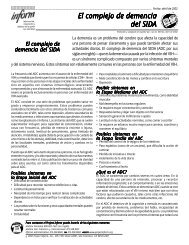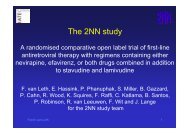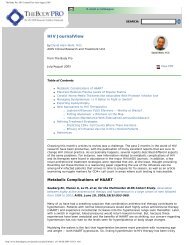here - CD8 T cells - The Body
here - CD8 T cells - The Body
here - CD8 T cells - The Body
Create successful ePaper yourself
Turn your PDF publications into a flip-book with our unique Google optimized e-Paper software.
SyStem’<br />
negotiate safe sex practices and so on and<br />
so forth.<br />
“You don’t want to get away from all<br />
the nurturing,” she notes, “but how do you<br />
take care of other people and take care of<br />
yourself as well? T<strong>here</strong> has to be some balance.<br />
Hopefully, counseling helps women<br />
achieve greater balance. It’s about feeling<br />
empowered enough to be themselves and<br />
to pursue things that they’re worthy of<br />
having in their lives,” says Burch.<br />
Instead, she finds that many women<br />
settle for less than they deserve, which can<br />
begin a cycle of more unhappiness in their<br />
lives. Others have problems establishing<br />
healthy relationships and may have negative<br />
coping skills, experiencing difficulty<br />
with attachment (including having many<br />
sexual partners) and figuring out who is<br />
worthy of being with them. <strong>The</strong>se women<br />
often feel that they have to accept bad<br />
behavior in order to be in a relationship or<br />
are confused about what they have to do<br />
to be in one.<br />
“T<strong>here</strong> are also issues around disclosure<br />
and that relates back to self-esteem and<br />
self-worth. It’s important for them to communicate<br />
with partners for their own health<br />
and also so that they can be truly known<br />
and accepted and loved,” she said. “This is<br />
similar to the things that other people are<br />
dealing with, being true to themselves.”<br />
Once a woman has a healthier relationship<br />
with herself, her other relationships<br />
are healthier too. Burch cites support<br />
groups and support buddies as being<br />
important for positive women, along with<br />
caring friends, family members, and supportive<br />
partners.<br />
“We were created to be in relationships<br />
with each other. It’s not just about<br />
romantic relationships, but about learning<br />
how to be a good parent and how<br />
to have a healthy friendship…all kinds of<br />
relationships that are essential to human<br />
existence,” she says. “Everyone needs a<br />
support system, and the healthier your<br />
support system, the better off you are.<br />
It’s about the people in your life who<br />
are for you and support you. That helps<br />
anybody’s mental health and physiological<br />
health as well. It helps anybody to become<br />
more resilient and do better.”<br />
What’s different for people living with a<br />
chronic illness like HIV, she says, is that the<br />
same skills they use for creating healthy<br />
relationships also work in managing their<br />
health care.<br />
“Sometimes negative issues can seep<br />
into their attitudes towards their health,<br />
their health care, and their provider.<br />
When I talk to them about using skills in a<br />
relationship, I recognize that those assertiveness<br />
skills can help them ask for what<br />
they need from their medical provider so<br />
they don’t just think that they go to their<br />
doctor and are told what to do, but report<br />
things that are of concern to them and<br />
ask, can we check into this?” Burch said.<br />
“Sometimes I rehearse with them. ‘What<br />
would you like to say when you go to the<br />
doctor?’ I had a client who felt that her<br />
doctor wasn’t listening to her. T<strong>here</strong> were<br />
some things that she thought needed to<br />
be addressed, but she was complaining<br />
about it to other people and not taking it<br />
back to the doctor to say ‘this really worries<br />
me’ or ‘I wish that at my last appointment<br />
we could have talked about this.’<br />
“So I helped her narrow down her complaints<br />
and her concerns to three things<br />
per visit, because t<strong>here</strong>’s some reality<br />
t<strong>here</strong> too. <strong>The</strong> doctor cannot spend 90<br />
minutes on a visit. <strong>The</strong> alternative was for<br />
her to feel consistently frustrated with her<br />
experience with the doctor,” Burch said.<br />
“She didn’t realize she could ask for what<br />
she wants. For the first item on her list, she<br />
was able to get a referral to a specialist.<br />
That also then reduced her anxiety and<br />
worry about what was going on with her.”<br />
She notes that not being able to communicate<br />
with a provider or understand<br />
what was being asked of them could lead<br />
some people to not take their medication<br />
correctly.<br />
Burch pointed to other practical things<br />
people can do to support their self-worth<br />
and value. “It could be as simple as putting<br />
on make-up. It could be signing up to take<br />
a class or to stop talking to someone who<br />
is not doing right by them—any behavioral<br />
steps that reinforce the message that<br />
they’re of value.”<br />
Going for counseling, she believes, is<br />
one big step towards self-care.<br />
“When you show up to therapy, that’s<br />
just in and of itself an affirmation that<br />
you’re worthy of a better life and this is<br />
part of what you are going to do about it,”<br />
Burch says. “T<strong>here</strong>’s always some kind of<br />
spark I see that pulls women in, something<br />
I can’t describe that gives them just a little<br />
bit of hope that things could be different.<br />
Especially for the women who are dealing<br />
with addiction, it’s that little piece of<br />
themselves that helps to pull them out,<br />
to show up on the doorstep of a detox or<br />
drug treatment program. T<strong>here</strong>’s a ton<br />
of internal strength and resiliency t<strong>here</strong>,<br />
and that’s something that I reflect back to<br />
them sometimes. ‘Look at all that you’ve<br />
been through to get to this point.’<br />
“When you see that spark, that’s the<br />
essence of who that person really is,” says<br />
Burch. “<strong>The</strong> trick is to get them to see it,<br />
despite their circumstances.”<br />
She sometimes suggests that people<br />
make positive affirmations, keep a journal,<br />
and read certain books or authors. While<br />
she can help weed out negative beliefs<br />
people have about themselves that they<br />
may not even be aware of, these activities<br />
can keep people focused on messages<br />
that are the opposite of the negative<br />
beliefs and feelings. “It’s about changing<br />
that message,” she said.<br />
She sometimes has clients take time<br />
to just relax and sit silently. Many people<br />
are often too busy running around doing<br />
everything they have to do to give themselves<br />
time for reflection and hearing<br />
what’s inside them, she said.<br />
Perhaps the most important part of<br />
her work, she believes, is treating people<br />
with kindness and respect. “That’s really<br />
at the core of the Chicago Women’s AIDS<br />
Project,” she notes. “<strong>The</strong> mission statement<br />
is about empowering women, seeing<br />
the value in each and every woman.”<br />
POSiTivElyAwARE.COM SEPTEMBER+OCTOBER 2012 29




